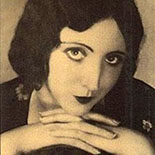 Anaïs Nin (born Angela Anaïs Juana Antolina Rosa Edelmira Nin y Culmell, February 21, 1903 – January 14, 1977) was an American author born to Spanish-Cuban parents in France, where she was also raised.
Anaïs Nin (born Angela Anaïs Juana Antolina Rosa Edelmira Nin y Culmell, February 21, 1903 – January 14, 1977) was an American author born to Spanish-Cuban parents in France, where she was also raised.
Nin spent some time in Spain and Cuba but lived most of her life in the United States where she became an established author. She published journals (which span more than 60 years, beginning when she was 11 years old and ending shortly before her death), novels, critical studies, essays, short stories, and erotica. A great deal of her work, including Delta of Venus and Little Birds, was published posthumously.
Nin is hailed by many critics as one of the finest writers of female erotica. She was one of the first women known to explore fully the realm of erotic writing, and certainly the first prominent woman in the modern West known to write erotica. Before her, erotica acknowledged to be written by women was rare, with a few notable exceptions, such as the work of Kate Chopin.
According to Volume I of her diaries, 1931–1934, published in 1966 (Stuhlmann), Nin first came across erotica when she returned to Paris with her husband, mother and two brothers in her late teens. They rented the apartment of an American man who was away for the summer, and Nin came across a number of French paperbacks: “One by one, I read these books, which were completely new to me. I had never read erotic literature in America… They overwhelmed me. I was innocent before I read them, but by the time I had read them all, there was nothing I did not know about sexual exploits… I had my degree in erotic lore.”
Faced with a desperate need for money, Nin, Miller and some of their friends began in the 1940s to write erotic and pornographic narratives for an anonymous “collector” for a dollar a page, somewhat as a joke. (It is not clear whether Miller actually wrote these stories or merely allowed his name to be used.) Nin considered the characters in her erotica to be extreme caricatures and never intended the work to be published, but changed her mind in the early 1970s and allowed them to be published as Delta of Venus and Little Birds.
Nin was a friend, and in some cases lover, of many leading literary figures, including Henry Miller, John Steinbeck, Antonin Artaud, Edmund Wilson, Gore Vidal, James Agee, James Leo Herlihy, and Lawrence Durrell. Her passionate love affair and friendship with Miller strongly influenced her both as a woman and an author. Nin wrote about her infatuation with the Surrealist artist Bridget Bate Tichenor in her diaries. The rumor that Nin was bisexual was given added circulation by the Philip Kaufman film Henry & June. This rumor is dashed by at least two encounters Nin writes about in her third unexpurgated journal, Fire. The first is with a patient of Nin’s (Nin was working as a psychoanalyst in New York at the time), Thurema Sokol, with whom nothing physical occurs. She also describes a ménage à trois in a hotel, and while Nin is attracted to the other woman, she does not respond completely (229–31). Nin confirms that she is not bisexual in her unpublished 1940 diary when she states that although she could be attracted erotically to some women, the sexual act itself made her uncomfortable. What is irrefutable is her sexual attraction to men.
Nin’s first unexpurgated journal, Henry and June, makes it clear, despite the notion to the contrary, that she did not have sexual relations with Miller’s wife, June. While Nin was stirred by June to the point where she says (paraphrasing), “I have become June,” she did not consummate her erotic feelings for her. Still, to both Anaïs and Henry, June was a femme fatale—irresistible, cunning, erotic. Nin gave June money, jewelry, clothes, oftentimes leaving herself broke. In her second unexpurgated journal, Incest, she wrote that she had an incestuous relationship with her father, which was graphically described (207–15). When Nin’s father learned of the title of her first book of fiction, House of Incest, he feared that the true nature of their relationship would be revealed, when, in fact, it was heavily veiled in Nin’s text.
In 1973 Anaïs Nin received an honorary doctorate from the Philadelphia College of Art. She was elected to the United States National Institute of Arts and Letters in 1974.
RISK
Anais Nin
And then the day came,
when the risk
to remain tight
in a bud
was more painful
than the risk
it took
to blossom.